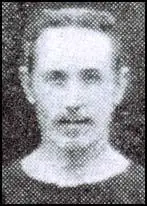George Ramsay

George Ramsay was born in Glasgow on 3rd March 1855. He moved to Birmingham in search of work. In 1874 Ramsay saw a Aston Villa practice session while out walking in Aston Park. Ramsay joined in the game and his excellent football skills resulting in him being invited to join the team. It was clear that Ramsay knew much more about football than the rest of the players and was appointed as their new captain. Ramsay later commented that the team's approach to football at the time was "a dash at the man and a big kick of the ball."
In 1876 George Ramsay persuaded Archie Hunter to join Aston Villa. Hunter, who had played football for Third Lanark, was a very talented centre-forward. Ramsay and Hunter introduced what was known as the "passing game". This was the main style used in Scotland whereas in England most teams relied on what was known as the "dribbling game".
Archie Hunter later described the important role that Ramsay played in the development of Aston Villa: Mr. Ramsay was practically the founder of the Aston Villa Football Club. He had had good tuition in the game while in Scotland and as a member of the Oxford Club he had gained plenty of experience and taken part in several first-class matches. Mr. Ramsay was a capital all-round player and could take any position and give a good account of himself."
As Graham McColl pointed out in his book, Aston Villa: 1874-1998: "The influence of Ramsay, then Hunter, led Villa to develop an intricate passing game, a revolutionary move for an English club in the late 1870s. It was a style of play modelled on that which was prevalent in Scotland at the time which was prevalent in Scotland at the time and which had been pioneered by Queen's Park, the Glasgow side. This type of sophisticated teamwork had rarely been employed in England. Instead, individuals would try to take the ball as far as they could on their own until stopped by an opponent."
Ramsay always wore a polo-cap and long shorts. William McGregor later recalled: "I can see now the little dapper, well-built laddie, with a black-and-red striped cap, red-and-blue hooped jersey, and the same coloured stockings, getting hold of the ball on the extreme wing, well within his own territory, and going off like streaked lightning, wiggling, waggling past opponents one after another and finally landing the ball between the sticks."
In the 1880-81 season Aston Villa won 21 of their 25 games. They also won the Staffordshire Cup that year. George Ramsay was in outstanding form. Unfortunately, a serious injury forced Ramsay to retire from first-class football in June, 1882. Two years later he was appointed as club secretary. A job he held until 1926.
George Ramsay died in Llandrindod Wells in October 1935.
Primary Sources
(1) Archie Hunter, Triumphs of the Football Field (1890)
While I was in Scotland I had become acquainted with the Calthorpe Football Club, which used to come up and play the second team of Queen's Park. There were some very fair players in the Calthorpe and I made up my mind, on arriving in Birmingham, to join them. But one of my fellow-workmen, George Uzzell, mentioned Aston Villa to me as a club that had come rapidly to the fore and asked me to become a member of it. I hesitated for some time, but at last my friend told me that a "brother Scot," Mr. George Ramsay, was the Villa captain and that decided me. Mr. Ramsay was a Glasgow man and had exerted himself very considerably to bring the Villa team into the front rank. He was himself a good right-wing forward and was well supported by W. B. Mason. So to Mr. Ramsay I went and we at once became good friends and remain so to this day.
Mr. Ramsay was practically the founder of the Aston Villa Football Club. He had had good tuition in the game while in Scotland and as a member of the Oxford Club he had gained plenty of experience and taken part in several first-class matches. A short time before he left, his club had tied three times with the Glasgow Rangers for the Scotch Cup. He was keeping goal and he relates that on the last occasion he saved his goal at the expense of a broken nose.
Mr. Ramsay was a capital all-round player and could take any position and give a good account of himself. Coming to Birmingham he found football here in a very backward state. The four principal clubs were St. Mary's, Aston Unity, Calthorpe and the Birmingham. One day Mr. Ramsay saw a few lads playing together in the big public park facing Park Road, Aston and he watched them with some amount of curiosity and amusement. They were connected with the Villa Cross Wesleyan Chapel and only had the most primitive ideas of the game. Mr. Ramsay describes their play as "a dash at the man and a big kick at the ball;" they were entirely ignorant of dribbling and were evidently in the most rudimentary stage of knowledge - quite "juvenile," as Mr. Ramsay said.
Well, when he had watched the lads some time he spoke to a bystander and suggested that they two should join in the game. Then he called to one of the players, William Weiss by name and proposed that he should be allowed to play on one side and his chance acquaintance on the other. When his broad Scotch had, after much trouble, been understood, the proposal was agreed to and Mr. Ramsay began to play. He soon showed that science was superior to all their big kicks and easily dribbled the ball past the men who had never seen a display of the kind before. They were amazed when they saw how he played and when all was over they surrounded the player, who had footed the ball.
